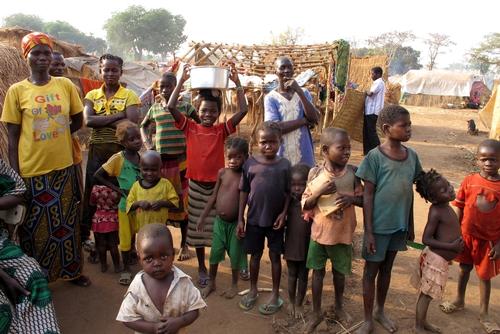Camp numbers continue to grow as families flee violence in the region
Batangafo – This week, MSF starts a round of vaccinations for at least 18,000 children up to 15 years old, most of them living in the IDP camp in Batangafo (northern CAR). The camp has become the largest in the country with around 35,000 people. Besides measles and polio vaccination, the children will receive vitamins and treatment against parasites.
Preparations for the vaccination campaign, initially scheduled for next month, have accelerated after suspected measles cases threatened to unleash an epidemic among children in the camp, where the population has not stopped growing since last August. The vaccination targets more than 16,000 children in the camp and around 2,000 more among the few families still living in their houses in Batangafo.
Last summer, some hundreds in Batangafo first settled there between the hospital and the headquarters of international peacekeepers, seeking protection after a series of armed clashes in the town. The lack of security, continuing looting and attacks by armed militias have increasingly forced Batangafo residents to leave their homes to stay in rudimentary huts in the camp, and today most neighbourhoods in town appear deserted.
Local residents are being joined by a growing number of people coming from the surrounding regions, where besides the militia violence they also have to face attacks from nomadic shepherd communities from the north. The traditional arrival of herdsmen after the end of the rainy season, around November, has always caused some friction with local inhabitants, mainly engaged in agriculture. But the current state of war in CAR has exacerbated the fighting to the point that thousands of people are now forced to flee increasingly armed groups of nomads, who are immersed in the spiral of violence that is devastating the country in the absence of international peacekeeping solutions.
The unstoppable growth of the Batangafo camp, initially prepared for 12,000 people, is pushing the limits of the area of the camp (about two square kilometres), which increases the risk to the displaced people’s health. “Overcrowding is a major risk factor for the occurrence of diseases in the camp,” says Carmen Terradillos, medical coordinator for MSF in Batangafo.
“In addition to starting the vaccinations, we are strengthening our hospital resources in case we see an increase of consultations. So far, there has been no large increase, partly because the first priority for many families is to find food for the day, so when someone is sick they don’t bring them to the doctor until their condition is severe.” In order to try and avoid that situation, MSF is enhancing health promotion activities among the displaced, and medical staff will start surveillance visits to the IDP camp.
Displaced people in Batangafo say the same thing again and again: they will not leave while there is no security for them, even though the rainy season will arrive within a couple of months. The huts are not prepared for the rain and many of them are located in areas where water stagnates. “We would love to leave, we want to return home, but if we do not have our safety granted we'll stay and do whatever it takes to strengthen the huts. We will not leave,” says Brigitte Befio, a Batangafo neighbour who has been living for months in the camp with her husband and five children.
“We will not move until the militias that attack us incessantly are disarmed,” says Lea Nukofio. She is 59 years old and cannot remember having seen such a level of violence in the country ever before. She has been fleeing attacks from all militias for two years along with a hundred or so people from her village near Kambakota, a village located about 50 kilometres west of Batangafo. “We will not move from here until their weapons have been removed,” she adds emphatically.
The daily arrival of dozens of people from the surroundings of Batangafo clearly shows that insecurity prevails throughout the area. MSF has five health posts in the periphery of this village, but the lack of security makes it impossible to manage the outposts and prevents thousands of people from receiving basic health assistance in the region. “These people are in an extremely vulnerable situation, even worse than those in the IDP camp. They have virtually nothing,” says Terradillos. “If there is no security on the roads we cannot provide essential medical attention,” adds Stella Aprile, deputy head of mission for MSF in the country. She explains that in northern CAR you find “all the typical diseases in the country, such as malaria, respiratory infections and conjunctivitis, and they all remain undiagnosed and without attention if we cannot intervene.”




